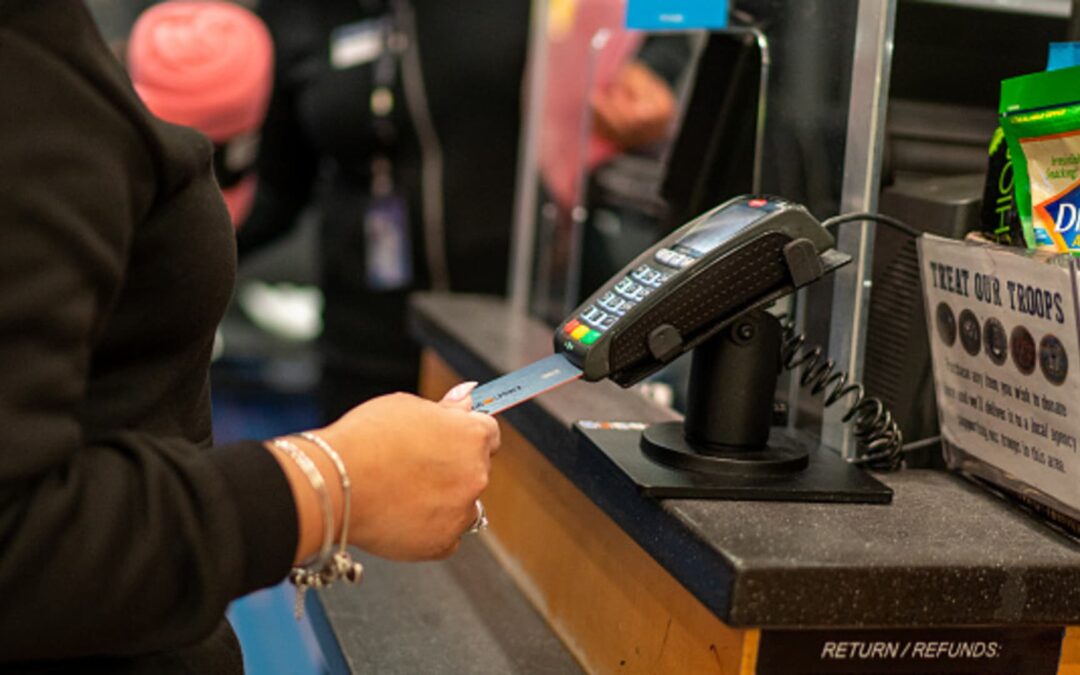A customer uses a credit card to pay for items January 28, 2022 at a retail shop in New York City.
Robert Nickelsberg | Getty Images
Banks that issue credit cards used by millions of consumers raised interest rates and introduced new fees over the past year in response to an impending regulation that most experts now believe will never take effect.
Synchrony and Bread Financial, which specialize in issuing branded cards for companies including Verizon and JCPenney, have said that the moves were necessary after the Consumer Financial Protection Bureau announced a rule slashing what the industry can charge in late fees.
“They’re the two banks that have been most vocal about it, because they were going to be the most impacted by it,” said Sanjay Sakhrani, a KBW analyst who covers the card industry. “The consensus now, however, is that the rule isn’t going to happen.”
The effect is that proposed regulation intended to save consumers money has instead resulted in higher costs for some.
On Nov. 22, CNBC reported that rates on a wide swath of retail cards have jumped in the past year, reaching as high as 35.99%. Synchrony and Bread raised the annual percentage rates, or APRs, on their portfolios by an average of 3 to 5 percentage points, according to Sakhrani.
On top of that, customers of the two banks have been given notice of new monthly fees of between $1.99 and $2.99 for receiving paper statements.
Customers of Synchrony bank have received notices for new monthly fees for receiving paper statements, part of the industry’s response to a CFPB rule capping late fees.
Source: Synchrony
Bread, which issues cards for retailers including Big Lots and Victoria’s Secret, began boosting the rate on some of its cards in late 2023 “in anticipation” of the CFPB rule, Bread CFO Perry Beberman told analysts in October.
“We’ve implemented a number of changes that are in market, including the APR increases and paper statement fees,” Beberman said at the time.
Some pain, no gain
The CFPB says the credit card industry profits off borrowers with low credit scores by charging them onerous penalties.
In March, the agency introduced a rule to cap late fees at $8 per incident, down from an average of about $32. The rule would save consumers $10 billion annually, the regulator said.
But banks and their trade groups have argued that late fees are a necessary deterrent to default and that capping them at $8 per incident would shift costs to those who pay their bills on time.
The U.S. Chamber of Commerce, which calls itself the world’s largest trade group, sued the CFPB in March to halt the rule, arguing that the agency exceeded its authority. In May, days before the rule was set to take effect, a federal judge granted the industry’s request to halt its implementation.
While the rule is currently held up in courts, card users are already dealing with the higher borrowing costs and fees attributed to the regulation.
The higher APRs kick in for new loans, not old debts, meaning the impact to consumers will rise in coming months as they accumulate fresh debts to fund holiday spending. Americans owe a record $1.17 trillion on their cards, 8.1% higher than a year ago, according to the Federal Reserve Bank of New York.
“Due to changes in regulatory conditions, we adjusted rates and fees to ensure that we can continue to provide safe and convenient credit to our customers,” said a spokeswoman for Stamford, Connecticut-based Synchrony.
Customers can avoid interest and fees by paying off balances in full and opting out of paper statements, the spokeswoman said.
Citigroup, Barclays
The surge in borrowing costs will have a bigger impact on consumers with lower credit scores who are more likely to have store cards issued by Synchrony and Bread.
Customers with poorer credit may be considered too risky to qualify for popular rewards cards from issuers including JPMorgan Chase and American Express, and are therefore more likely to turn to co-branded cards as alternatives.
That’s why Synchrony and Bread were eager to mitigate the hit to their operations by increasing rates and introducing fees, according to analysts. The concern was that more of their customers would simply default on loans if late penalties shrank to $8, and the profitability of their businesses would take a dive.
But other, larger banks have moved rates higher as well.
Cards from Banana Republic and Athleta issued by Barclays each saw an APR jump of 5 percentage points in the past year. The Home Depot card from Citigroup had a rise of 3 percentage points, while the bank raised the APR on its Meijer card by 4 percentage points.
Citigroup and Barclays representatives declined to comment.
Capital One, which had warned earlier in the year that it would take steps to offset the hit from the CFPB rule, said that instead of changing its customer pricing it opted to hold back on making certain unspecified investments. The bank is in the process of acquiring rival card issuer Discover Financial.
Even before it was set to take effect in May, the fate of the CFPB rule was considered murky, because litigation fighting it was filed in a venue widely seen as favorable to corporations seeking to beat back federal regulation.
But after the election victory of Donald Trump, who has broadly pushed for deregulation across industries, the expectation is that the next CFPB head isn’t likely to keep the effort alive, according to policy experts.
When asked if they would reverse the higher APRs and fees if the CFPB rule went away, Synchrony managers were noncommittal. The bank has to proceed as though it were happening, CFO Brian Wenzel told analysts in October.
“People use the term ‘rollback,'” Wenzel said. “As a company, we haven’t spent any real time thinking about that.”
— CNBC’s Gabrielle Fonrouge contributed to this report.









